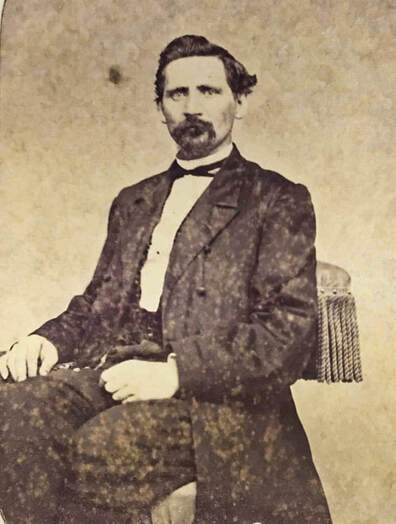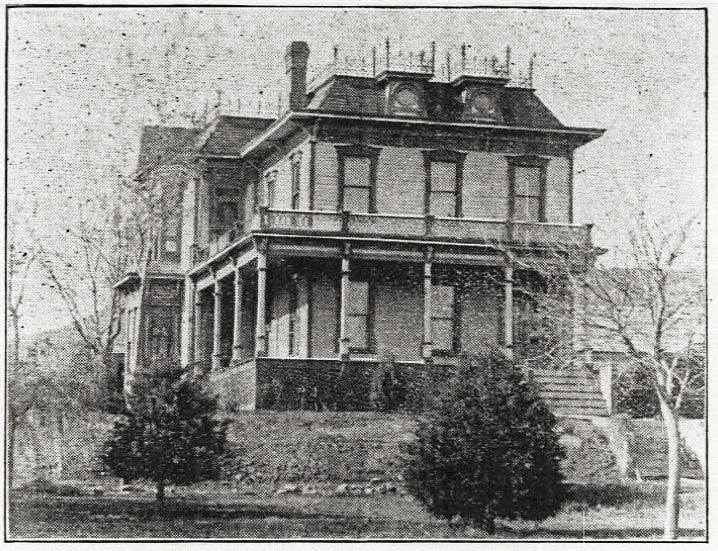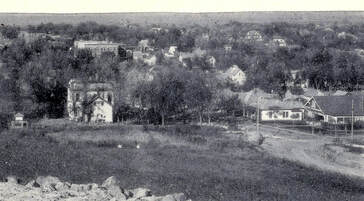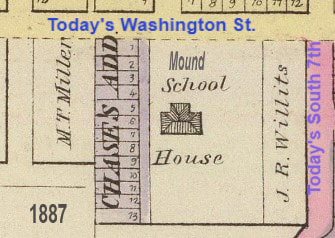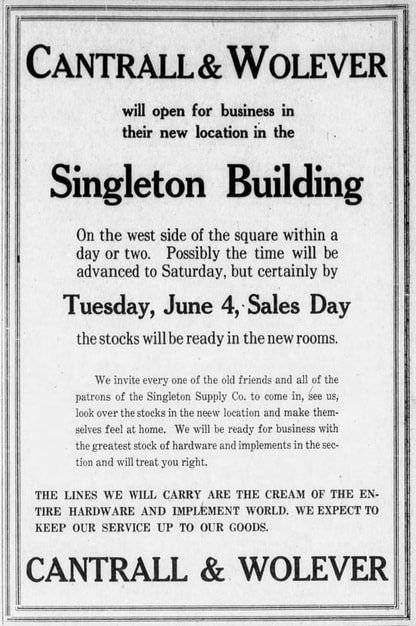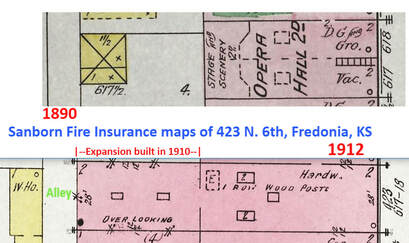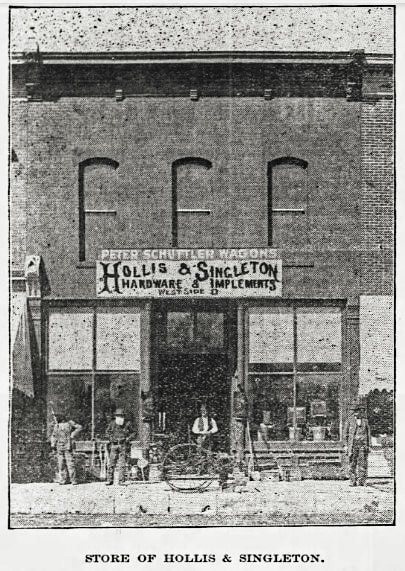|
Published by Byron Schroder
Facebook, 2023 Fredonia, KS Dr. James Ray Willits, M.D., 1830 - 1908, came to Fredonia in 1871. He first settled about a block west of what later would become the MoPac Depot. His land took up most of the area east of Salt Creek. By the late 1880s, Dr. Willits had purchased the land east of the Mound School site, south and west from the future intersection of Washington and S. 7th, and built a large home snuggled against the mound, set back from the rugged street by a long drive. He would live out his remaining years there. One of Dr. Willits’ sons, Willard Eugene Willits, went into the dry goods business at the age of 16. He was operating out of the A. O. Smith building on the west side (today’s Larry Marshall Realty) when the disastrous 1886 fire wiped out everything north of that building. While his store and stock did not burn, much of it was damaged and destroyed as helpful people tried to empty the stock from it and the nearby stores before the flames spread. Dr. Willits made plans for a new building to house his son’s dry goods and an added grocery department. In 1887, he had completed the interior of the first floor of two storefronts in the middle of the destroyed block, where his son would occupy the north room with a large opera house planned above both. The Willits’ Opera House While the former Hudson Opera House west of the southwest corner of the square was known to many Fredonia natives, few know of the earlier Willits’ Hall. The Willits’ Opera House on the second floor was not completed until Feb. 1888. It opened one year before the Hudson opened in March 1889. In May 1888, the Willits’ Opera House was reported to be the home to Fredonia High School’s first commencement ceremony of nine students, before the future ceremonies were moved to the larger Hudson. Many meetings and town gatherings were held at Willits’ Hall over the next few years. The terms hall and opera house were interchanged in news stories over the time it was operating. Tragically, in 1892, Willard Eugene Willits, son of Dr. Willits, died in the home he shared with his parents on S. 7th St. He died unexpectedly in his early 30s on New Year’s Eve, of a heart disorder. All businesses closed for his funeral the following week. After his son’s death, Dr. Willits spent most of his time tending to the business, having retired from his physician practice. The big shows in the opera house had almost completely gone to the larger Hudson Opera House, where traveling performances and community meetings were often booked. The Willits’ Hall was used for many dances, socials, and church and club meetings up until 1900. Dr. Willits did little to promote his son’s former business with hardly any advertising. He would eventually close it and sold the building to O. V. Small in 1900. The Hubbell Dept. store leased the space for a short time, adding the two rooms to their existing three storefronts to the south. They soon reduced their footprint back to their original three storefronts. The Hardware Store Hollis & Singleton started business in 1898 on the west side in the building just north of the Willits store, in the space today occupied by the chiropractic office. Within years, they expanded into the former Willits space and operated out of both buildings. Their former space north became their undertaking department for a while until it was later merged into the larger building. Within a few years, major renovations were made to the building, including the removal of the center staircase that led to the Willits' Hall and the dividing wall that had made two separate stores on the first floor. The front part of the upper floor was removed, and a new wall closed off what remained of the Opera House stage. It is believed that this is when the large staircases on the north side were added, as Joseph Hollis had been a long-time carpenter before going into the hardware business. The undertaking department was moved upstairs into part of the former opera space. Wagons and implements were initially shown on the south side of the first floor but later moved to the second floor. C. A. Singleton bought out Joe Hollis in 1907 and operated alone for the next decade. In 1910, Singleton had added a large addition to the rear of the store that went to the alley, making the store nearly double in size. It included a partial basement at the rear which held a plumbing business and an electric elevator to move stock to the upper floor. Walter Cantrall and Jim Wolever had bought Pinney Hardware on the south side in 1912 and a few years later bought the hardware department from Hess & Kisor, another Fredonia store. Cantrall & Wolever Hardware was initially in the west half of the building that later housed City Drug. In May 1918, they bought out Singleton Supply and moved into their large double building on the west side. Singleton kept part of the second floor for a short time, selling Dodge cars from there. He later built the brick building behind the store on 5th St. for that business. Cantrall & Wolever operated until 1930 when they sold out to Arthur and Clifford Hollis, sons of Joseph Hollis, who had had the business many years before. They operated Hollis Hardware for many decades until they retired, selling it to Paul Wagner. The building is currently vacant. =====/===== A story on Dr. Willits was published in the Wilson County Citizen, on May 12. 1899: J. R. Willits, M.D., whose name is closely associated with Fredonia’s development. The medical fraternity of Fredonia reflects great credit upon the profession, and its individual members have always enjoyed the esteem and confidence of the public. The pioneer physician among their number, a man who has practiced medicine in Wilson-co. for over a quarter of a century, is Dr. J. R. Willits, the subject of this brief sketch. A native of New Jersey, he removed from that state to Indiana at 1837. His early education was received in the schools of La Porte, Ind. The careful preparation for his life avocation is evidenced in the fact that Dr. Willits took three full courses at the Indiana Medical College at Indianapolis, from which institution he graduated in the spring of 1861. From January 1862, until the close of the Rebellion, he was in the United States service, having been appointed acting assistant surgeon. He had practiced in Illinois and Indiana prior to coming to Leavenworth, Kan., in 1865, but since that date has been a continuous resident of the Sunflower State. In the fall of 1871, he took up his residence in Fredonia, where he acquired an extensive practice, which in late years he has gradually relinquished, owing partly to other business duties, and to his advanced age. The mercantile business which bears his name was established by W. E. Willits, his son, in 1878. Since the death of this promising and brilliant young businessman, Dr. Willits has conducted the store. Another son is the senior member of the successful law firm of Willits & Cooper. Personally Dr. Willits is a good townsman, imbued with a commendable spirit of pride in Fredonia’s advancement, from a few straggling buildings to a compactly built little city. A man of sound judgment and pronounced magnetism, the weight of his influence has always been along lines which tended to the betterment of the community and a position at the head of the local medical fraternity has long been justly accorded him both by the public and his fellow practitioners. Dr. Willits has retired entirely from active practice and is spending the declining years of his life in his handsome Fredonia home, surrounded by the comforts richly earned by a lifetime of assiduous efforts and well-doing. He has climbed the ladder of success and is enjoying a merited rest. |
